人教版(2019)选择性必修 第四册Unit4 Sharing Using language 1 课件 (共33张PPT)
文档属性
| 名称 | 人教版(2019)选择性必修 第四册Unit4 Sharing Using language 1 课件 (共33张PPT) |
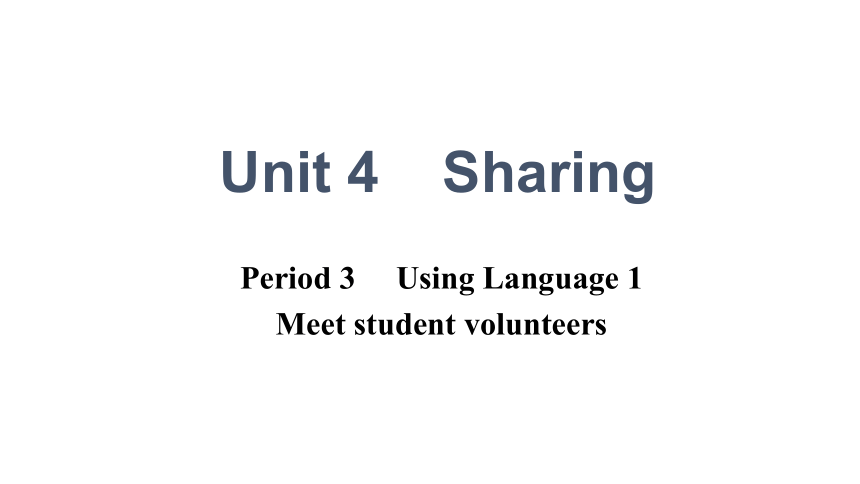
|
|
| 格式 | ppt | ||
| 文件大小 | 2.7MB | ||
| 资源类型 | 教案 | ||
| 版本资源 | 人教版(2019) | ||
| 科目 | 英语 | ||
| 更新时间 | 2024-11-18 11:44:49 | ||
图片预览

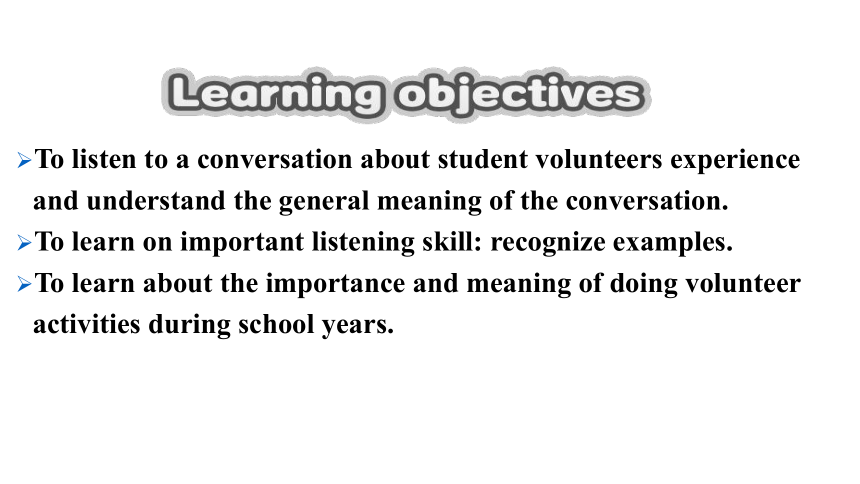
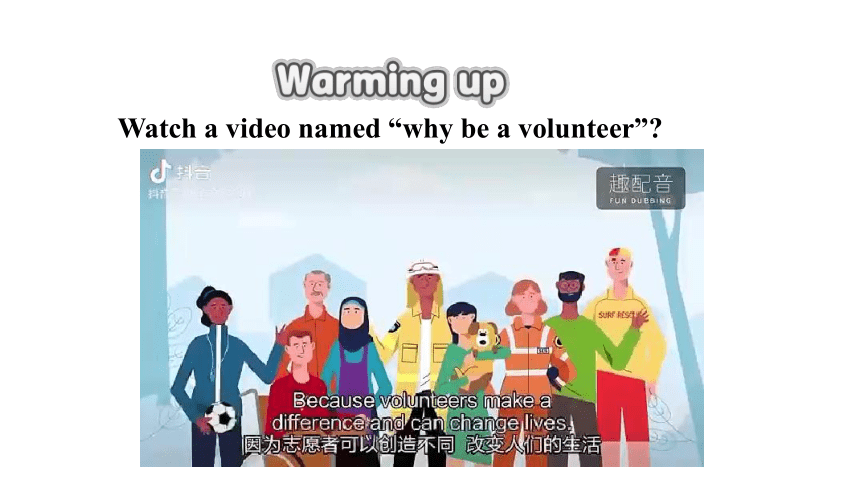
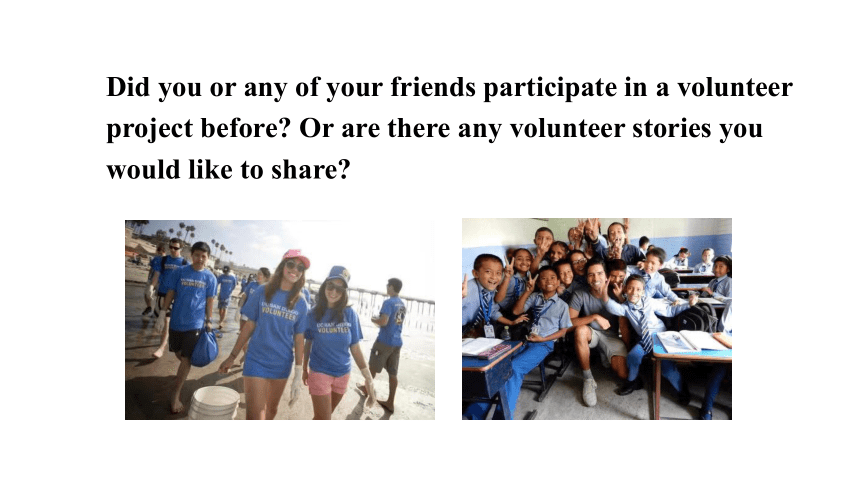
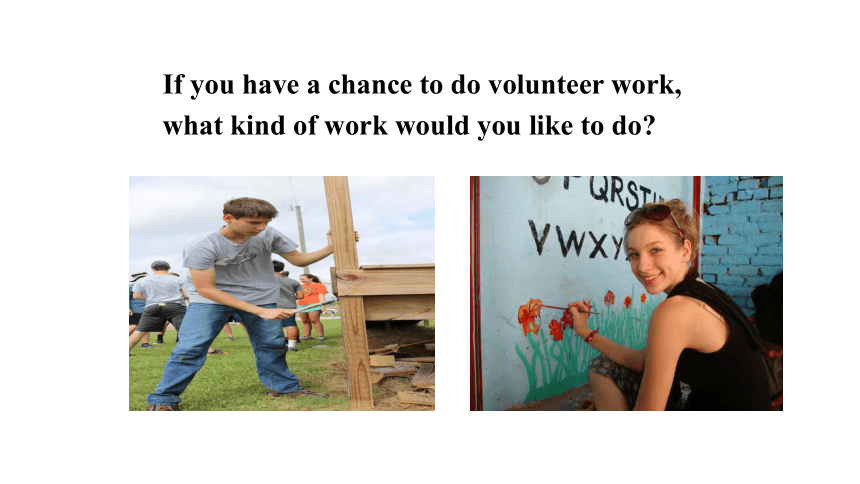
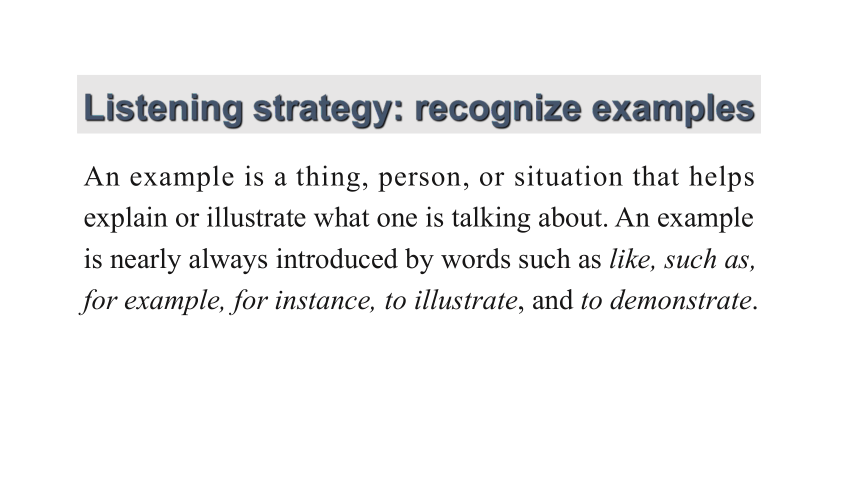
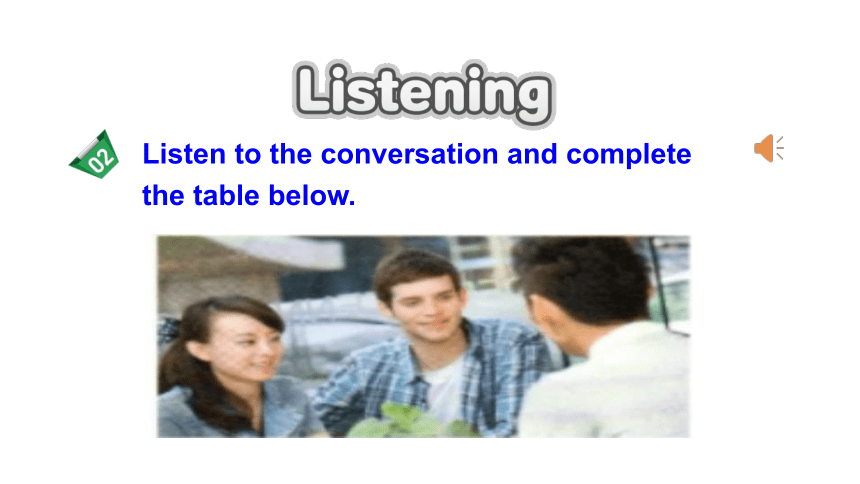
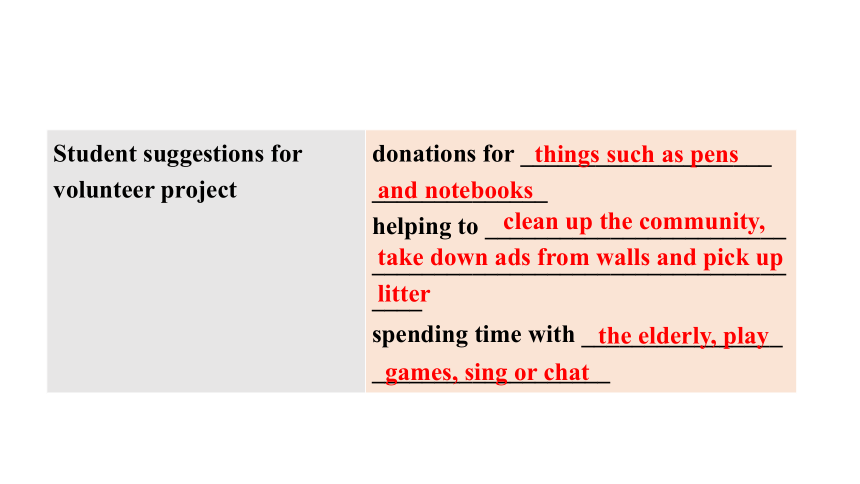
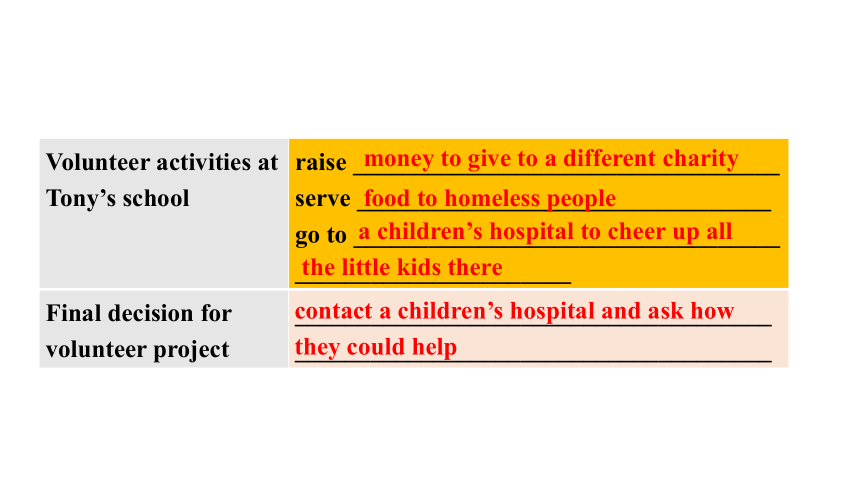
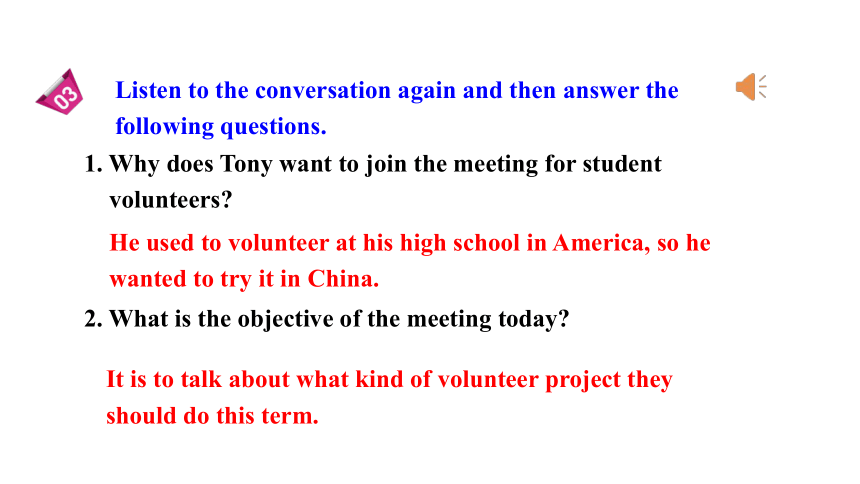
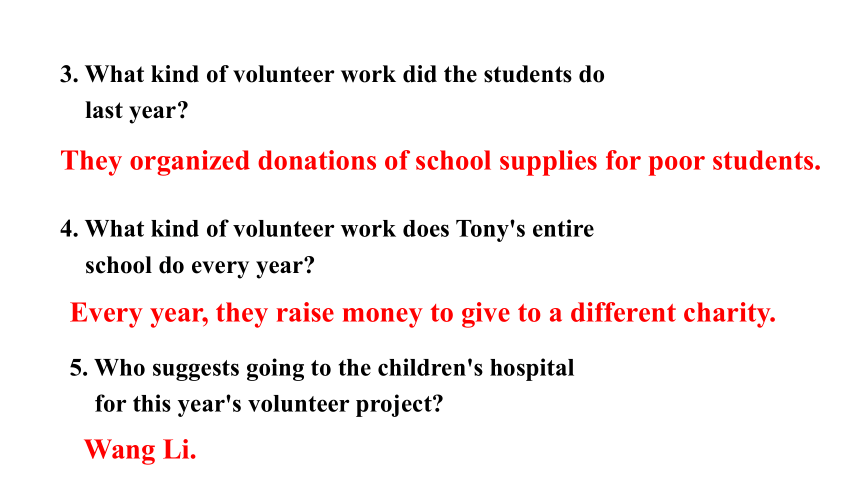
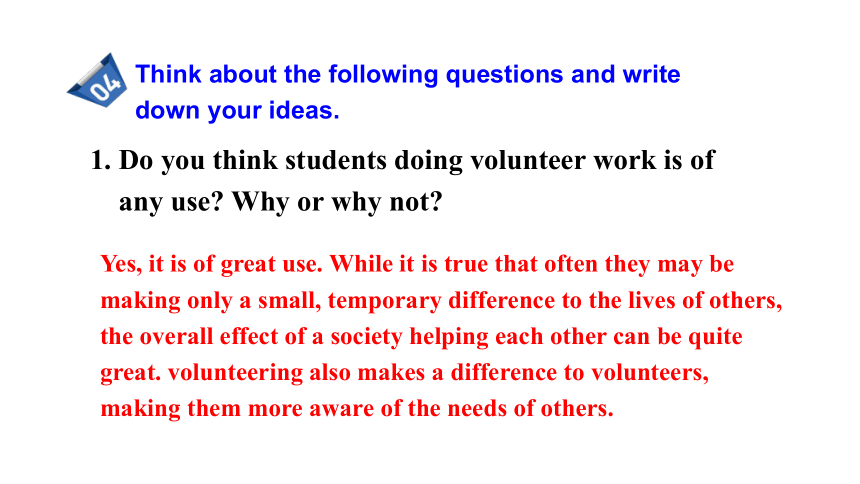
文档简介
(共33张PPT)
Period 3 Using Language 1
Meet student volunteers
Unit 4 Sharing
To listen to a conversation about student volunteers experience and understand the general meaning of the conversation.
To learn on important listening skill: recognize examples.
To learn about the importance and meaning of doing volunteer activities during school years.
Watch a video named “why be a volunteer”
Did you or any of your friends participate in a volunteer project before Or are there any volunteer stories you would like to share
If you have a chance to do volunteer work, what kind of work would you like to do
An example is a thing, person, or situation that helps explain or illustrate what one is talking about. An example is nearly always introduced by words such as like, such as, for example, for instance, to illustrate, and to demonstrate.
Listening strategy: recognize examples
Listen to the conversation and complete the table below.
Student suggestions for volunteer project donations for ____________________
______________
helping to ________________________
_____________________________________
spending time with ________________
___________________
things such as pens and notebooks
clean up the community, take down ads from walls and pick up litter
the elderly, play games, sing or chat
Volunteer activities at Tony’s school raise __________________________________
serve _________________________________
go to __________________________________
______________________
Final decision for volunteer project ____________________________________________________________________________
money to give to a different charity
food to homeless people
a children’s hospital to cheer up all the little kids there
contact a children’s hospital and ask how they could help
Listen to the conversation again and then answer the following questions.
1. Why does Tony want to join the meeting for student
volunteers
2. What is the objective of the meeting today
He used to volunteer at his high school in America, so he wanted to try it in China.
It is to talk about what kind of volunteer project they should do this term.
3. What kind of volunteer work did the students do
last year
4. What kind of volunteer work does Tony's entire
school do every year
They organized donations of school supplies for poor students.
Every year, they raise money to give to a different charity.
5. Who suggests going to the children's hospital
for this year's volunteer project
Wang Li.
Think about the following questions and write down your ideas.
1. Do you think students doing volunteer work is of
any use Why or why not
Yes, it is of great use. While it is true that often they may be making only a small, temporary difference to the lives of others, the overall effect of a society helping each other can be quite great. volunteering also makes a difference to volunteers, making them more aware of the needs of others.
2. In your opinion, which is better, giving people things, time,
or money Why do you think so
I think all three are important. People should give what they have. Not everyone has money, but they may have time. On the other hand, some people have a lot of money to give, but are quite busy. Giving people things may not always be the best, as so often money is more useful – with money people can easily buy things they need. However, if the things are given with love and the things are given with love and the person receiving that gift can feel that love, then it is a good gift.
In groups, talk about ways to help others.
1. What kinds of help do you think people need
How do you think volunteers could help
Place What are the needs How could voluunteers help
Neighbourhood
School
There are many elderly people in my neighbourhood who are living alone.
Volunteers could visit the elderly, make sure they are OK, and provide companionship and support.
The school owns some land not being used.
Volunteers could clear it, plant grass, and put a fence around it so that it can be used by students.
Place What are the needs How could volunteers help
City/ Town
Country
We live in a scenic area, but there is a bad issue of litter on empty plots of land.
Volunteers can go out and pick up the litter. They can also install public rubbish bins along the streets.
There are some poor people in rural areas who do not have access to many of the things people living in the city take for granted.
Volunteers could join or help the poverty alleviation programmes to revitalize the poor areas, send money, or provide trainings and support to the needy.
2. What kinds of skills and qualities could you offer as
a volunteer
Skill Quality
I am good at writing and photography, and I know how to organize things.
I am patient and hardworking.
3. Discuss where and how you can help
Where would it be possible for you and your classmates to volunteer
What kind of volunteer work could you and your classmates do, based on your group’s skills and qualities
Making suggestions
We might try… Couldn’t you/ we…
Perhaps we could… May I suggest that…
Would you consider… My advice would be to …
Wouldn’t it be better if … If I may suggest an idea, …
It might be a good idea to…
I’d like to suggest/ recommend that …
How does the idea of … appeal to you
A: So, what kind of volunteer project should we do this term
B: There are many elderly people living in my neighbourhood.
Perhaps we could go visit them and see how we can help
them.
C: Well, that’s true of your neighbourhood, but it isn’t true of
mine.
D: It isn’t true of mine either.
C: You know, there are a lot of empty plots of land in our
city that are full of rubbish. We might try cleaning them
up.
D: The problem is that there are only a few of us. We don’t
have enough people to do all that work.
A: Well, my advice would be to start a public campaign to
get others involved.
B: That’s a great idea! I volunteer at a local radio station. I
could appeal for help.
A: And I love to write. I could write the text for those posters.
C: Wonderful! So we’re all set
B: It looks like we are.
1. Read the conversation below. Decide which type of stress the words in red show:
1) strong emotion
2) emphasis of important information
3) correction of a mistake
4) contrast or comparison
Jessie: Hi, Susan! Did you see the animal shelter advertisement I think it'd be great for our volunteering project!
Susan: Hello, Jessie. Yes, I did see it. I'd love to help out in a shelter. Think of all those cute, little animals!
Jessie: Exactly, and it would also look great on our CVs.
But maybe it's too good to be true...
Susan: Yeah, what if we have to clean out the smelly cages
I'd hate that!
Jessie: Well, we can ask for gloves. How about you clean the outside of the cages, and I'll clean the inside
Susan: Thanks, Jessie, you're a true friend! Anyway, we
should check the timing. Did the ad say Saturday
afternoons I'm usually busy on Saturday afternoons
Jessie: No, it said on Sundays, and in the mornings. So let's
not just talk about it– let's do it! It's so exciting– do
you like cats best, or dogs
Susan: Oh, hey wait, Jessie, do you think it matters that I'm
allergic to cats And what if there are snakes
strong emotion: great; love; hate; snakes
emphasis of important information: did; Saturday afternoons
correction of a mistake: Sundays; mornings
contrast or comparison: outside; inside; talk; do; cats; dogs
2. Listen to the conversation and then
practice it with a partner.
In pairs, role-play an conversation about volunteering work based on the conversation you just heard.
Volunteer
Work
Place
Purpose
Activity
Skill & quality
In pairs, design a volunteer activity for your community, calling on people to donate things to people in need. Try to think of some meaningful activities.
Listening text
Tony: Hi! Is this the meeting for student volunteers
Wang Li: Hi,Tony!Yes,it is!
Tony: Oh, hi, Wang Li! I used to volunteer at my high school in America,so I wanted to try it here in China.
Peipei: We're glad you're here! Our meeting today is to talk about what kind of volunteer project we should do this term.
Wang Li: Peipei,may I suggest that we do something for schools in poor areas Perhaps we could organise donations of things such as pens and notebooks, or other school supplies for poor students.
Peipei: Good idea,but we did that last year. Wouldn't it be better if we did something different this year, like organising students to volunteer their time
Wang Li: Like what
Peipei: Well,like cleaning up the community, taking down ads from walls, and picking up litter. It might be a good idea to contact the community office and ask how we can help.Do you guys have any other ideas
Wang Li:How about writing to some nursing homes to see if they need someone to spend time with the elderly people We can play games,sing, or just chat!
Tony: That sounds like one of my school's volunteer projects.
Wang Li:Really What other volunteer projects does your school take part in
Tony:Oh,all kinds. Every year, our whole school raises money to give to a different charity.For instance, we donated to a medical charity last year, and to an education charity before that. We raise money in different ways, such as by making and selling things, or holding a marathon and asking people to promise to donate for every kilometre we run. We also have weekly volunteer groups.
Peipei: That sounds interesting! What do the groups do
Tony: Well, on Fridays,there are student volunteers who help serve food to homeless people.And on Saturday mornings, a group of students goes to a children's hospital to cheer up all the little kids there.
Wang Li: Hey, I was also thinking we could contact a children's hospital and ask how we could help. How does that idea sound,Peipei
Peipei: I love that idea! Thanks, Tony and Wang Li!
Tony: No problem, I'm glad to help. Volunteering is something we should all do.
Design a volunteer activity for your community, calling on people to donate old clothes to help people in need.
Discuss with your partners what kind of skills and qualities you have. Bring it to share with your class.
Haste makes waste.
欲速则不达。
Period 3 Using Language 1
Meet student volunteers
Unit 4 Sharing
To listen to a conversation about student volunteers experience and understand the general meaning of the conversation.
To learn on important listening skill: recognize examples.
To learn about the importance and meaning of doing volunteer activities during school years.
Watch a video named “why be a volunteer”
Did you or any of your friends participate in a volunteer project before Or are there any volunteer stories you would like to share
If you have a chance to do volunteer work, what kind of work would you like to do
An example is a thing, person, or situation that helps explain or illustrate what one is talking about. An example is nearly always introduced by words such as like, such as, for example, for instance, to illustrate, and to demonstrate.
Listening strategy: recognize examples
Listen to the conversation and complete the table below.
Student suggestions for volunteer project donations for ____________________
______________
helping to ________________________
_____________________________________
spending time with ________________
___________________
things such as pens and notebooks
clean up the community, take down ads from walls and pick up litter
the elderly, play games, sing or chat
Volunteer activities at Tony’s school raise __________________________________
serve _________________________________
go to __________________________________
______________________
Final decision for volunteer project ____________________________________________________________________________
money to give to a different charity
food to homeless people
a children’s hospital to cheer up all the little kids there
contact a children’s hospital and ask how they could help
Listen to the conversation again and then answer the following questions.
1. Why does Tony want to join the meeting for student
volunteers
2. What is the objective of the meeting today
He used to volunteer at his high school in America, so he wanted to try it in China.
It is to talk about what kind of volunteer project they should do this term.
3. What kind of volunteer work did the students do
last year
4. What kind of volunteer work does Tony's entire
school do every year
They organized donations of school supplies for poor students.
Every year, they raise money to give to a different charity.
5. Who suggests going to the children's hospital
for this year's volunteer project
Wang Li.
Think about the following questions and write down your ideas.
1. Do you think students doing volunteer work is of
any use Why or why not
Yes, it is of great use. While it is true that often they may be making only a small, temporary difference to the lives of others, the overall effect of a society helping each other can be quite great. volunteering also makes a difference to volunteers, making them more aware of the needs of others.
2. In your opinion, which is better, giving people things, time,
or money Why do you think so
I think all three are important. People should give what they have. Not everyone has money, but they may have time. On the other hand, some people have a lot of money to give, but are quite busy. Giving people things may not always be the best, as so often money is more useful – with money people can easily buy things they need. However, if the things are given with love and the things are given with love and the person receiving that gift can feel that love, then it is a good gift.
In groups, talk about ways to help others.
1. What kinds of help do you think people need
How do you think volunteers could help
Place What are the needs How could voluunteers help
Neighbourhood
School
There are many elderly people in my neighbourhood who are living alone.
Volunteers could visit the elderly, make sure they are OK, and provide companionship and support.
The school owns some land not being used.
Volunteers could clear it, plant grass, and put a fence around it so that it can be used by students.
Place What are the needs How could volunteers help
City/ Town
Country
We live in a scenic area, but there is a bad issue of litter on empty plots of land.
Volunteers can go out and pick up the litter. They can also install public rubbish bins along the streets.
There are some poor people in rural areas who do not have access to many of the things people living in the city take for granted.
Volunteers could join or help the poverty alleviation programmes to revitalize the poor areas, send money, or provide trainings and support to the needy.
2. What kinds of skills and qualities could you offer as
a volunteer
Skill Quality
I am good at writing and photography, and I know how to organize things.
I am patient and hardworking.
3. Discuss where and how you can help
Where would it be possible for you and your classmates to volunteer
What kind of volunteer work could you and your classmates do, based on your group’s skills and qualities
Making suggestions
We might try… Couldn’t you/ we…
Perhaps we could… May I suggest that…
Would you consider… My advice would be to …
Wouldn’t it be better if … If I may suggest an idea, …
It might be a good idea to…
I’d like to suggest/ recommend that …
How does the idea of … appeal to you
A: So, what kind of volunteer project should we do this term
B: There are many elderly people living in my neighbourhood.
Perhaps we could go visit them and see how we can help
them.
C: Well, that’s true of your neighbourhood, but it isn’t true of
mine.
D: It isn’t true of mine either.
C: You know, there are a lot of empty plots of land in our
city that are full of rubbish. We might try cleaning them
up.
D: The problem is that there are only a few of us. We don’t
have enough people to do all that work.
A: Well, my advice would be to start a public campaign to
get others involved.
B: That’s a great idea! I volunteer at a local radio station. I
could appeal for help.
A: And I love to write. I could write the text for those posters.
C: Wonderful! So we’re all set
B: It looks like we are.
1. Read the conversation below. Decide which type of stress the words in red show:
1) strong emotion
2) emphasis of important information
3) correction of a mistake
4) contrast or comparison
Jessie: Hi, Susan! Did you see the animal shelter advertisement I think it'd be great for our volunteering project!
Susan: Hello, Jessie. Yes, I did see it. I'd love to help out in a shelter. Think of all those cute, little animals!
Jessie: Exactly, and it would also look great on our CVs.
But maybe it's too good to be true...
Susan: Yeah, what if we have to clean out the smelly cages
I'd hate that!
Jessie: Well, we can ask for gloves. How about you clean the outside of the cages, and I'll clean the inside
Susan: Thanks, Jessie, you're a true friend! Anyway, we
should check the timing. Did the ad say Saturday
afternoons I'm usually busy on Saturday afternoons
Jessie: No, it said on Sundays, and in the mornings. So let's
not just talk about it– let's do it! It's so exciting– do
you like cats best, or dogs
Susan: Oh, hey wait, Jessie, do you think it matters that I'm
allergic to cats And what if there are snakes
strong emotion: great; love; hate; snakes
emphasis of important information: did; Saturday afternoons
correction of a mistake: Sundays; mornings
contrast or comparison: outside; inside; talk; do; cats; dogs
2. Listen to the conversation and then
practice it with a partner.
In pairs, role-play an conversation about volunteering work based on the conversation you just heard.
Volunteer
Work
Place
Purpose
Activity
Skill & quality
In pairs, design a volunteer activity for your community, calling on people to donate things to people in need. Try to think of some meaningful activities.
Listening text
Tony: Hi! Is this the meeting for student volunteers
Wang Li: Hi,Tony!Yes,it is!
Tony: Oh, hi, Wang Li! I used to volunteer at my high school in America,so I wanted to try it here in China.
Peipei: We're glad you're here! Our meeting today is to talk about what kind of volunteer project we should do this term.
Wang Li: Peipei,may I suggest that we do something for schools in poor areas Perhaps we could organise donations of things such as pens and notebooks, or other school supplies for poor students.
Peipei: Good idea,but we did that last year. Wouldn't it be better if we did something different this year, like organising students to volunteer their time
Wang Li: Like what
Peipei: Well,like cleaning up the community, taking down ads from walls, and picking up litter. It might be a good idea to contact the community office and ask how we can help.Do you guys have any other ideas
Wang Li:How about writing to some nursing homes to see if they need someone to spend time with the elderly people We can play games,sing, or just chat!
Tony: That sounds like one of my school's volunteer projects.
Wang Li:Really What other volunteer projects does your school take part in
Tony:Oh,all kinds. Every year, our whole school raises money to give to a different charity.For instance, we donated to a medical charity last year, and to an education charity before that. We raise money in different ways, such as by making and selling things, or holding a marathon and asking people to promise to donate for every kilometre we run. We also have weekly volunteer groups.
Peipei: That sounds interesting! What do the groups do
Tony: Well, on Fridays,there are student volunteers who help serve food to homeless people.And on Saturday mornings, a group of students goes to a children's hospital to cheer up all the little kids there.
Wang Li: Hey, I was also thinking we could contact a children's hospital and ask how we could help. How does that idea sound,Peipei
Peipei: I love that idea! Thanks, Tony and Wang Li!
Tony: No problem, I'm glad to help. Volunteering is something we should all do.
Design a volunteer activity for your community, calling on people to donate old clothes to help people in need.
Discuss with your partners what kind of skills and qualities you have. Bring it to share with your class.
Haste makes waste.
欲速则不达。
